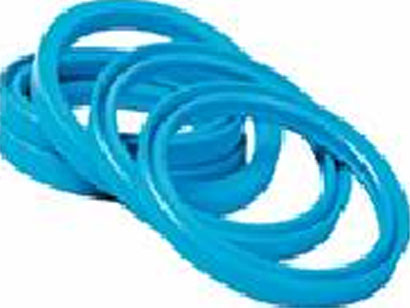Rod Seals: Essential Sealing Solutions for Hydraulic Systems
Rod seals play a crucial role in hydraulic and pneumatic systems by ensuring leak-proof performance and maintaining system efficiency. As a key component in hydraulic cylinders, rod seals prevent fluid leakage and protect the internal components from external contaminants such as dust, dirt, and moisture.
At Rubber Seals and Gaskets, we provide high-quality rod seals designed to enhance the performance and longevity of hydraulic systems across various industries. In this comprehensive guide, we’ll explore the functions, types, benefits, applications, and selection criteria of rod seals to help you make an informed decision for your sealing needs.
What are Rod Seals?
Rod seals are dynamic sealing elements positioned inside the cylinder head of a hydraulic system. Their primary function is to prevent hydraulic fluid from leaking out while allowing the rod to move back and forth efficiently. These seals help maintain the necessary hydraulic pressure, ensuring the system operates smoothly under high loads and varying pressure conditions.
Rod seals are critical in preventing contamination, as they form a barrier against dust, dirt, and moisture, which can degrade hydraulic components over time.
Types of Rod Seals
Rod seals are available in different materials and designs to suit a variety of hydraulic applications. The most common types include:
1. U-Cup Seals
Feature a U-shaped cross-section for excellent sealing performance.
Offer low friction and high wear resistance.
Suitable for medium to high-pressure applications.
2. PTFE Rod Seals
Made from PTFE (Polytetrafluoroethylene) for superior resistance to high temperatures and chemicals.
Provide excellent low-friction performance.
Ideal for high-speed hydraulic systems.
3. V-Ring Seals
Designed for dynamic applications with rotary or oscillating movements.
Prevent contamination and extend seal life.
Commonly used in pumps, compressors, and hydraulic actuators.
4. Chevron Seals (V-Packings)
Composed of multiple stacked rings for multi-lip sealing.
Excellent for heavy-duty applications requiring high-pressure resistance.
Used in piston and rod sealing systems.
5. Compact Seals
Combine multiple sealing elements in one design.
Offer enhanced leak-proof performance.
Used in cylinders requiring compact sealing solutions.
Key Benefits of Rod Seals
Rod seals provide numerous advantages that contribute to the efficiency and longevity of hydraulic systems:
1. Leak Prevention & System Efficiency
Prevents hydraulic fluid leakage, reducing maintenance downtime.
Helps maintain pressure levels, ensuring smooth operations.
2. High Wear Resistance & Durability
Made from premium materials like polyurethane (PU), PTFE, and Nitrile Rubber (NBR).
Withstands abrasion, friction, and high-pressure conditions.
3. Optimal Performance in Extreme Conditions
Designed to operate in high temperatures, aggressive fluids, and harsh environments.
4. Contaminant Protection
Blocks dust, dirt, and moisture, preventing system degradation.
5. Energy-Efficient Design
Reduces friction, minimizing power loss and enhancing system efficiency.
Applications of Rod Seals
Rod seals are widely used across various industries, including:
1. Heavy Machinery & Construction Equipment
Excavators, bulldozers, and cranes rely on rod seals for leak-proof hydraulic cylinders.
2. Automotive & Transportation
Used in power steering, suspension systems, and braking mechanisms.
3. Aerospace & Aviation
Found in landing gear, flight control systems, and aircraft hydraulic actuators.
4. Industrial & Manufacturing
Essential in hydraulic presses, machine tools, and automation systems.
5. Oil & Gas Industry
Utilized in high-pressure hydraulic cylinders for drilling rigs and offshore platforms.
6. Marine & Offshore Equipment
Used in ship steering mechanisms and hydraulic lifting systems.
How to Select the Right Rod Seal?
Choosing the correct rod seal is essential for optimal hydraulic system performance. Consider the following factors when selecting a rod seal:
1. Material Compatibility
Select materials that can withstand hydraulic fluid types, temperature variations, and pressure levels.
Common materials include NBR, FKM, PTFE, and polyurethane (PU).
2. Pressure and Temperature Ratings
Ensure the seal can function effectively under operating pressure and temperature extremes.
3. Seal Design & Profile
Choose a design that matches your cylinder requirements.
Consider factors such as friction, flexibility, and lip configuration.
4. Environmental Conditions
Assess exposure to chemicals, UV radiation, dirt, and abrasive particles.
Why Choose Rubber Seals and Gaskets for Rod Seals?
At Rubber Seals and Gaskets, we provide high-performance rod seals for various industrial applications. Our key advantages include:
✔ Premium-Quality Materials – We use advanced elastomers, PTFE, and polyurethane for durability and efficiency. ✔ Custom Sealing Solutions – Tailored designs to meet specific application needs. ✔ State-of-the-Art Manufacturing – Precision-engineered seals for superior sealing performance. ✔ Expert Guidance & Support – Our team offers technical assistance to help you select the right seal. ✔ Competitive Pricing & Fast Delivery – Get high-quality rod seals at the best prices with prompt shipping.
Conclusion
Rod seals are essential components in hydraulic and pneumatic systems, preventing leaks, maintaining system pressure, and ensuring smooth machinery operation. Whether used in construction, automotive, aerospace, or industrial applications, selecting the right rod seal is crucial for achieving optimal system performance.
At Rubber Seals and Gaskets, we offer top-quality rod seals designed for durability, efficiency, and reliability. Contact us today to explore our wide range of hydraulic sealing solutions!

FAQs
NBR, PU, PTFE, and FKM are commonly used materials for high-performance rod seals.
They create a tight seal around the piston rod, preventing hydraulic fluid from escaping.
Yes! Our rod seals are engineered to withstand high-pressure and high-speed environments.
Absolutely! We offer custom rod seals to meet unique industry requirements
Upgrade your hydraulic systems with high-quality rod seals from Rubber Seals and Gaskets! Contact us today for expert advice and premium sealing solutions.
